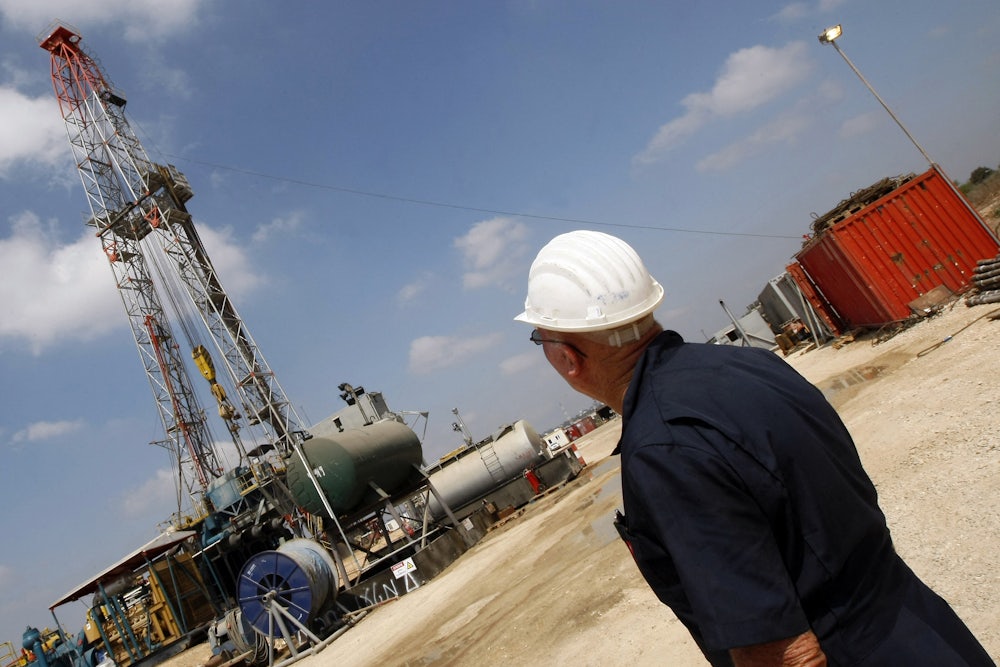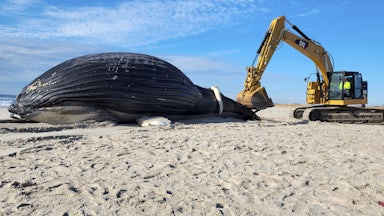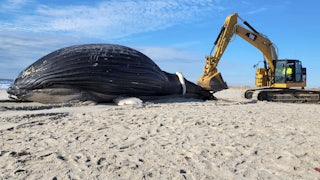Looking at the promoted advertising for Zion Oil & Gas that has popped up on social media feeds in recent weeks, you might think the company was like any other firm drilling for oil in the Middle East. Click an image of a wellhead set against a facsimile of the Israeli flag, and you’ll arrive at the Zion website, with an offer to invest in “Israel’s Economic and Political Independence.” For $250 you’ll receive that amount of ZOG stock—publicly traded on OTCQX, a market for securities not listed on major U.S. exchanges like the Nasdaq or NYSE—and fifty 25-cent “warrants” that allow you (for one year) to purchase ZOG shares for just 25 cents apiece, regardless of how much it happens to cost when you opt to use the warrants. If you sign up to automatically invest anew each month, you’ll get an additional 50 warrants. ZOG shares, though, are currently trading for just $0.05.
Founded in 2000, Zion Oil & Gas is an oil and gas company that drills exclusively in Israel and to date has “no economically recoverable reserves,” per recent filings with the Securities and Exchange Commission. It’s also a for-profit extension of the extremist, apocalyptic ideology that’s received renewed attention this week after one of its leading proponents appeared on a bill that included the likes of Senate Majority Leader Chuck Schumer and House Speaker Mike Johnson.
On Tuesday, onetime Zion Oil & Gas investor and far-right pastor John Hagee—who’s implied that Jews should be grateful for Hitler—addressed the March for Israel in D.C. Hagee’s brand of Christian Zionism is rooted in a belief that Israel will be the site of the “Battle of Armageddon” once it is maintained as a Jewish state. As God triumphs over the forces of evil, per Hagee’s 2007 book, Jews will survive long enough to have “the opportunity to receive Messiah, who is a rabbi known to the world as Jesus of Nazareth.” From then on there will be “one king, and one leader, Jesus Christ the Son of God. One law, it will be his law.”
Outlining his vision for the company, Zion Oil & Gas founder John Brown claims he has been “ordained by G-d” to discover oil in Israel. “I believe,” he writes, “that G-d has promised in the Bible to bless Israel with one of the world’s largest oil and gas fields and this will be discovered in the last days before the Messiah returns.” The company’s fourth drilling site is in the Jezreel Valley, which, according to Brown, will play host to Armageddon—the “final showdown between good and evil.” He’s also described the special responsibility of Christians vis-à-vis Jews in Israel:
As a Christian, one must recognize that it is written “... if [we] the Gentiles have been made partakers of their [Israel’s] spiritual things, their [Gentiles’] duty is also to minister to them [Israel] in material things.” (Romans 15:27) Because “the G-d of heaven He will prosper us [Zion]” (Nehemiah 2:20) with the oil of Israel ... so that we a new covenant people of Zion will minister and assist “Israel in their petroleum and material needs.” Because, as touching the election, “they [the Jewish People] are beloved for the sake of the fathers.” (Romans 11:28) And, when they do turn to the Lord, the veil on their hearts will be taken away. (2 Corinthians 3:14-16)
Former Zion CEO and Texas Railroad commissioner Victor Carillo has said similarly that discovering oil in Israel would “hasten the second coming of Jesus Christ.” It’s on that faith that Zion appears to have courted faith-based investors in its project of striking oil in Israel despite having yet to find anything to sell.
The Financial Times reported in 2018 that Zion spends extensively on marketing and investor relations, having at one point worked with a telemarketing firm whose clients include religious organizations and businesses. Brown has appeared on the Christian Television Network, and Zion has been name-checked by Donald Trump evangelical adviser David Jeremiah. The Dallas Morning News interviewed several Zion investors, many of whom had recruited family and friends to do the same, as part of an investigation into the company in 2017. An SEC investigation into the company, begun in 2018, was reportedly concluded in April without recommendations for enforcement action.
A dedicated “Prayer Site” on Zion’s website invites participants to pray for the company through web comments and request prayers for themselves and loved ones. “My husband and I need prayer for our health, animals and finances,” reads one entry from the summer of 2021. “There’s so much we’d like to do before we get too old. Please Lord give us favor. My entire IRA is in Zion and another stock that tanked. Please Lord let this suffering end worldwide.”
“I am a believer in God,” another commenter wrote in 2020, “and I am very grateful to have found a company to invest some savings that I had been investing in the stock market. Today I am very sure that this investment will multiply a thousand times one.”
Despite Zion having been granted a new exploration license from the Israeli government in September, the company’s prospects seem, by its own account, bleak. Activities are suspended “as a result of the Israel-Hamas War,” per a quarterly report filed with the Securities and Exchange Commission on November 9. So far this year the company has accrued a net loss of $6.2 million and accumulated a $285 million deficit. “These factors raise substantial doubt about the Company’s ability to continue,” the report states. “To carry out planned operations, the Company must raise additional funds through additional equity and/or debt issuances or through profitable operations. There can be no assurance that this capital or positive operational income will be available to the Company, and if it is not, the Company may be forced to curtail or cease exploration and development activities.”
Though Zion reports “no revenue” from oil and gas operations, its top managers have made out pretty well. Another recent SEC filing shows that Brown made $1.7 million as the company’s executive chairman between 2020 and 2022. CEO Robert Dunn took home $1.2 million over the same time period, during which Zion’s CFO and its president made $1.1 million and $1.3 million, respectively.
The most recent fundraising push appears to be capitalizing on the war in Israel-Palestine. The day after I signed up to receive an informational packet about Zion Oil & Gas through its website, I received an automated email from marketing and investor relations manager Andrew Summey with three action items: to update my email settings, sign up to receive an information packet “highlighting Zion’s vision for Israel’s economic and political independence through the discovery of oil and/or gas” (if I had not already), and to “take a moment to pray for Zion Oil & Gas. There are many difficult challenges toward exploring for oil and gas in the region.”
A post on the company’s LinkedIn page from last week states:
Israel is currently in a state of war with Hamas who recently attacked its land and people. From Zion’s inception, our vision has been to help the State of Israel become self-sufficient through the exploration and ultimate production of domestic oil and gas resources. This present conflict has only underscored the critical necessity of fulfilling our vision for the State of Israel.
The irony of all this is that, as I wrote earlier this week, Israel has indeed begun producing a tremendous amount of fossil fuels in the time since Zion Oil & Gas got there—no thanks to them. Massive reserves in the Mediterranean Sea have fueled a push by successive Israeli governments to become a major gas exporter to its neighbors and to Europe; just last month, Israel’s Ministry of Energy granted six companies exploration licenses for the Levant Basin.
A representative for Zion Oil & Gas did not respond to multiple requests for comment for this piece.






